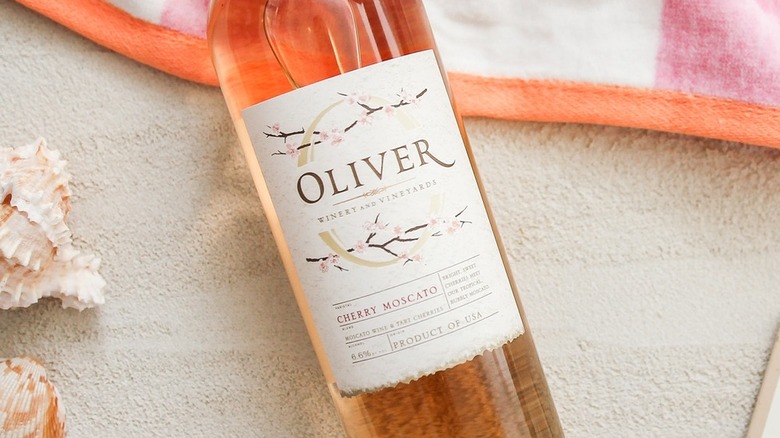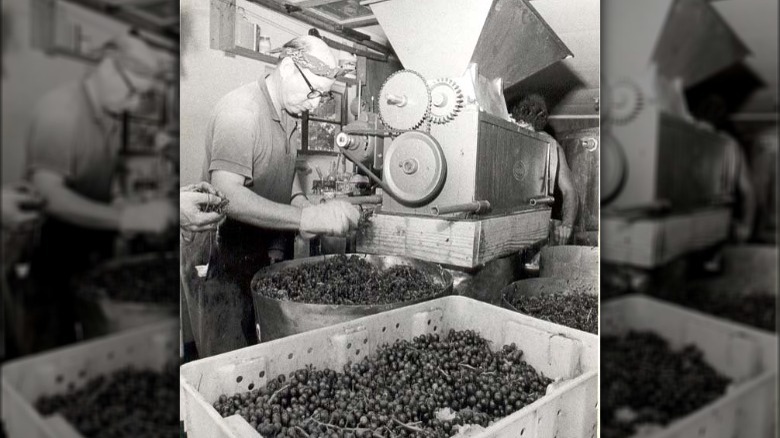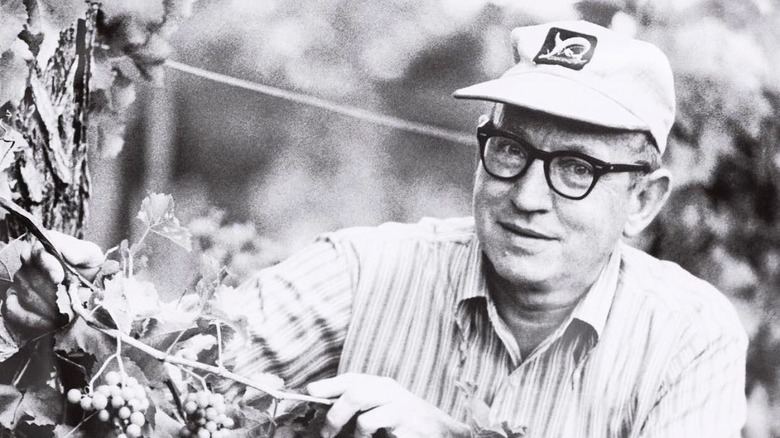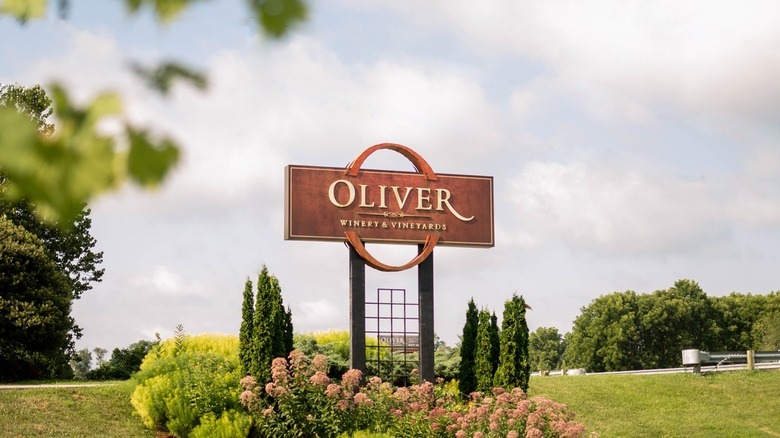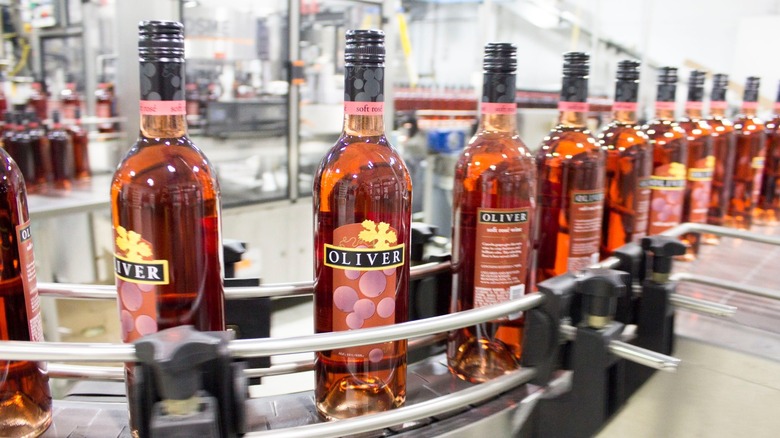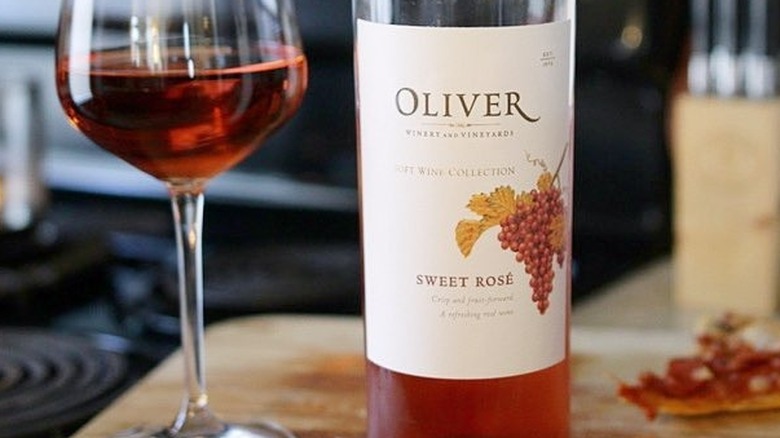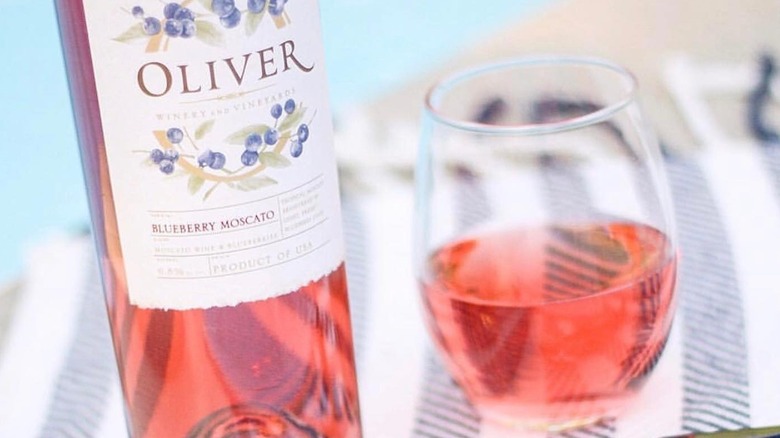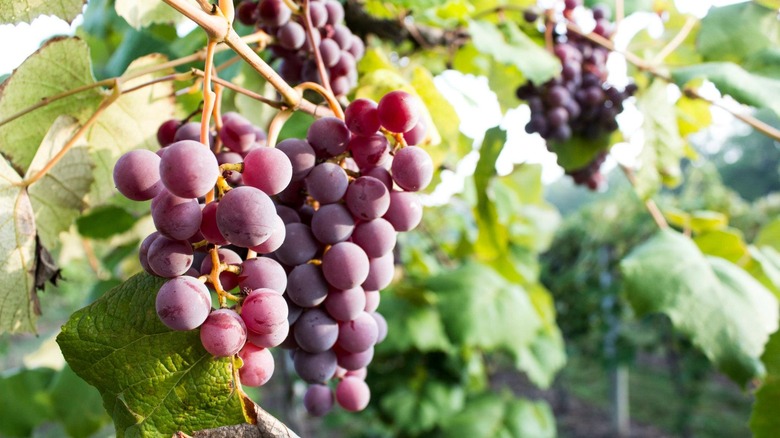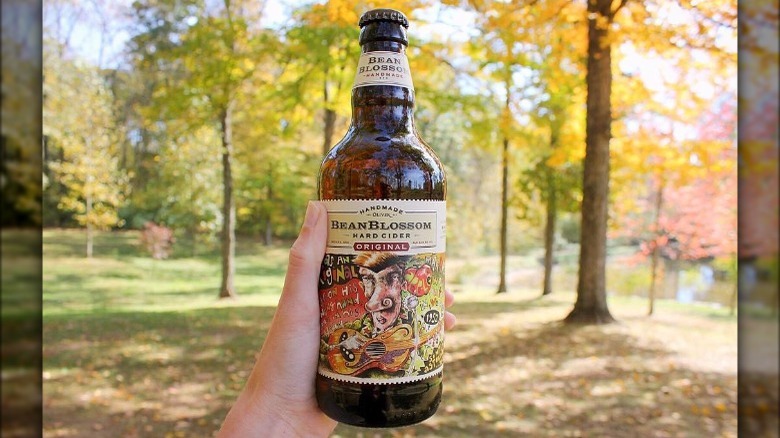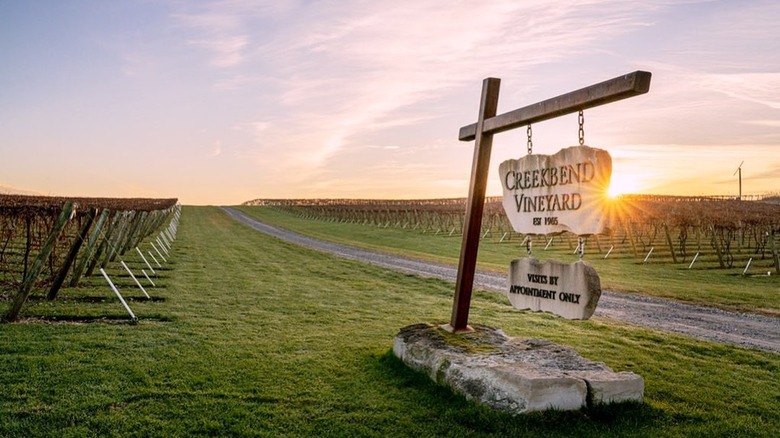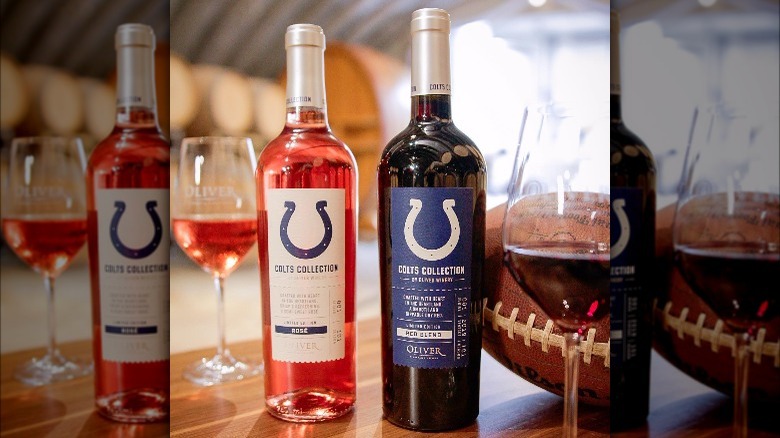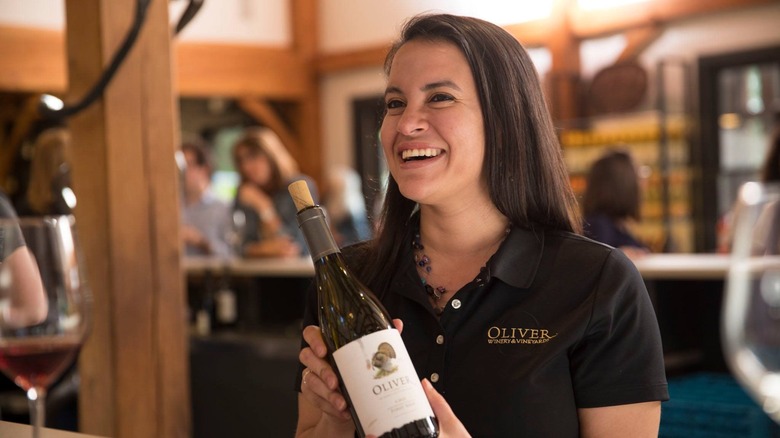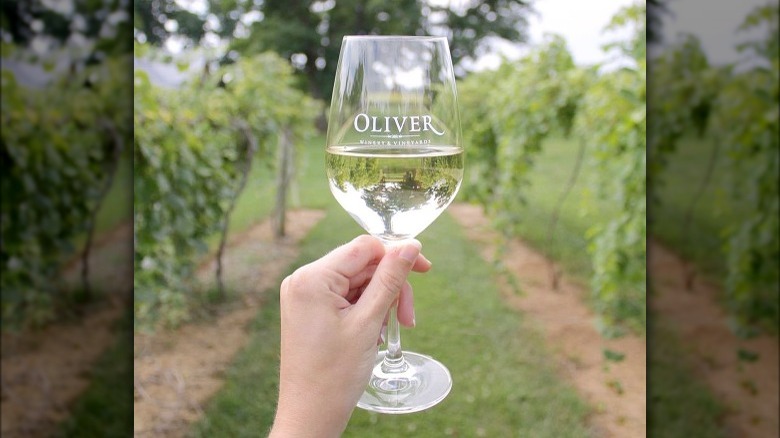The Untold Truth Of Oliver Winery
When you think of American wineries, you most likely think of the rolling hills of northern California, and specifically, the Napa Valley. Yet, tucked away in the Midwestern town of Bloomington, Indiana, is an emerging brand that has been taking the wine world by storm. Oliver Winery isn't new: The label has been around for half a century. However, the last few years have seen this brand skyrocket in popularity. So if you haven't heard of this winemaker yet, that will likely change in the very near future.
Whether you're a new fan of wine or a longtime connoisseur, there are several chapters in the story of Oliver Winery that you might not be familiar with. There's so much to know about this brand, from its humble origins in Indiana and its meteoric rise to the national spotlight to its partnership with the Indianapolis Colts and its sale to brand-new owners.
Oliver Winery started as a law professor's hobby
The history of Oliver Winery can be traced back more than 50 years ago (via Oliver Winery). In the 1960s, Indiana University law professor William Oliver began making wine in his basement as a hobby. Not long after, he set up a vineyard outside the town of Bloomington.
The vineyard produced more grapes than Oliver could use for himself, leading him to open a commercial winery in 1972. The Oliver Winery had quite humble beginnings, according to Bill Oliver, William's son. Phil has spent time digitizing old photographs that show the small-scale, humble beginnings of the winery (via Beverage Industry).
But the elder Oliver pressed on, even keeping his teaching job to keep the business afloat. According to Bill, his dad had to teach in order to pay the winery bills.
According to Bill, it can be difficult to make the transition from teaching full-time to becoming a full-time winery owner due to the risk factors. The risk paid off and then some, as the winery celebrates its 50th anniversary in 2022.
Oliver Winery's founder helped pass a law allowing wine production in Indiana
When William Oliver wanted to start a commercial winery, it wasn't as simple as planting some vines, stomping some grapes, and placing an "Open" sign out front (via Vino Ventures). In fact, wineries weren't even legal in the state of Indiana at the time.
A lawyer like William Oliver was just the person to end to that restrictive law, and that's precisely what he did. Bill Oliver played an instrumental role in the creation and passage of the 1971 Indiana Small Winery Act. In addition to the establishment of small wineries, the bill allowed the retail sale of wine within the state. It was this latter aspect that helped Oliver Winery get off the ground because it enabled direct-to-consumer (DTC) sales.
Bill Oliver, William's son and the co-founder of Oliver Winery, told Beverage Industry wineries cannot just start out selling 100,000 cases via a distributor. Today, there are nearly 120 wineries in the state of Indiana, according to Purdue University, all thanks to professor William Oliver.
It's the one of the largest wineries in the country
Oliver Winery has grown from one person's hobby to a major player in the country's wine industry (via Wine Business Magazine). As of 2020, Oliver Winery was the 43rd largest winery in the United States after selling 400,000 cases of vino. Only two other wineries in the Midwest were bigger: Cooper's Hawk Winery and the Terlato Wine Group.
But since then, Oliver Winery has risen in the rankings, thanks in large part to a banner 2020. According to Oliver Winery CEO Julie Adams, even during the pandemic and the closing down of tasting rooms, the winery still sold more than 700,000 cases of wine (via Beverage Industry). That jump in sales now places Oliver Winery as the 29th largest winery in the United States.
Don't be surprised if the Midwestern operation keeps climbing the rankings. In August of last year, the winery installed a second high-speed bottling line, allowing it to increase its output by nearly 50%. In turn, Oliver Winery anticipated selling 900,000 cases of wine in 2021.
It's one of the fastest-growing wineries in the U.S.
How do you become one of the largest wineries in the country? By continually growing. And Oliver Winery has done that at a higher rate than nearly all of its competitors. In 2020, Market Watch magazine named Oliver Winery one of the fastest growing wineries in the U.S. (via Inside Indiana Business). According to Julie Adams, the president of Oliver Winery, the people at the brand are proud to have experienced this kind of growth.
At the time, Oliver Winery had recently expanded its footprint to 38 states. That corresponded with a huge jump in sales. Oliver sold more than 500,000 cases of wine in 2019, a 19% increase from the year before. That proved to be a proverbial drop in the bucket. The following year, Oliver Winery sold 740,000 cases, according to the Indy Star, a whopping 40% jump from 2019. The brand had doubled production in the last two years, and it hopes to keep expanding as long as the demand exists (via Beverage Industry).
Oliver's skyrocketing success has come as surprise even to those closest to the business. The brand has gone from being a small winery in Indiana to being a major part of the wine scene in the U.S.
Oliver Winery specializes in sweet wines
Oliver Winery's slogan is "wine is for everyone," and it has the portfolio to back it up (via Beverage Industry). From its citrusy Camelot Mead to its dessert Creekbend Tawny, Oliver Winery boasts a product line that includes more than 30 different wine varieties. But it all starts with its award-winning Oliver Sweet Red.
This sweeter, less acidic vino helped set Oliver Winery apart from other brands, especially when the company was still getting off the ground. The wine became the brand's flagship offering, although, according to Bill Oliver, it came about due to dumb luck. There were several winemakers who began offering sweet wines when there was a demand for them. However, Oliver Winery has sold sweet wines from the very beginning.
The brand was in touch with what its customers wanted, and it received a lot of great feedback from the tasting room. People loved the classic ruby-red Concord, and the brand has used good-quality fruit in the making of the wine. Oliver Winery has since expanded its line of sweet wines to include a sweet rosé, sweet white, and sweet red lime.
Oliver Winery's moscato wines are best-sellers
Among Oliver Winery's wide array of products, few are more popular than its fruit-flavored Moscatos. The winery unveiled its Cherry and Blueberry varieties in 2019 and 2020, respectively, and the two quickly joined the ranks of the top-selling Moscatos in the United States, according to Forbes. Oliver Winery has since added a Lemon Moscato to its product line, which ran out after its first production.
These uber-successful wines started out as mere experiments in 2015. They were originally only offered at the Oliver Winery tasting room. According to Dennis Dunham, Oliver Winery's vice president of operations and director of winemaking, the people at the brand have had a lot of fun experimenting with different juices and extracts in the winemaking process, and Cherry Moscato and Blueberry Moscato have become wholesale successes.
The secret to the fruity Moscatos' success, according to Oliver Winery, is high quality at a reasonable price. All three varieties retail for just $14. These wines aren't just affordable, they're also approachable, and the quality speaks for itself.
Oliver Winery sources fruit from around the country
All the fruit that is used to make Oliver Wine's best-selling Moscatos has to come from somewhere. And the winery doesn't just grab what's available at the local farmer's market. Instead, it sources fruit from the top growers in the country (via Oliver Winery). Apples, cherries, and orange blossom honey are sourced from Michigan, while blackberries and blueberries stem from Oregon.
And while Oliver makes wine from its own grapes grown at home in Indiana, it also sources the fruit from the West Coast and the Great Lakes region. David Dunham, Oliver Winery's vice president of operations and director of winemaking, Oliver Winery has a close relationship with growers, which helps the brand pick the best produce for its wines (via Beverage Industry).
Bringing in resources from across the country may seem like a great deal of work, but Oliver believes the quality of these fruits is what makes all the difference in its trademark wines. Sweet wines are what Oliver Winery does best, and the brand will likely keep making and offering fruit-forward wines that are intriguing and delicious.
Oliver Winery also dabbles in the world of hard ciders
It's never a bad idea to diversify your business, and that's precisely what Oliver Winery did in 2014 when it got in on the hard cider trend (via Globe Newswire). The winemaker launched its new product, dubbed BeanBlossom Hard Cider, that summer.
As it turns out, Oliver Winery was already well suited for the cider business as its state-of-the-art winemaking equipment was capable of producing cider. All it took was a measly $1 million investment in bottling technology, and Oliver Wines was off and running. And Oliver Wines didn't have to look far for its main ingredient.
The winery uses apples from its neighboring state of Michigan. Using the best-quality apples is integral to making cider, and Michigan apples are at the core of the Oliver Winery apple cider. According to Bill Oliver, the brand proudly supports orchards in the Midwest to create an incredible cider.
Over the years, Oliver Winery has expanded its hard cider line. The drink now comes in three varieties: Original, peach, and bourbon barrel.
There may be some benefits to a winery that isn't located in California
When you think of wine in the United States, your mind immediately focuses on the state of California, home to the lush hillside vineyards of Napa Valley. According to the National Associate of Wine Producers, California is responsible for 85% of the wine made in the U.S. So, if you're a winery, the West Coast is where you want to be, right?
Not so fast, say the founders of Oliver Winery. An overabundance of wine means an overabundance of wineries. As of 2018, California had 4,501 wineries, nearly six times as many as the next closest state. In other words, California has 4,501 competitors that are all vying for consumers' attention.
This is why the people at Oliver Winery feel it's beneficial to be far away from the wine capital of the country (via Inside Indiana Business). According to Bill Oliver, it has actually been beneficial for the company to be situated away from the competition in California since the state is home to 5,000-6,000 wineries. Oliver Winery's Indiana location allows the brand to thrive.
Oliver Winery also believes it can make wines of equal quality in Indiana, thanks to its unique geography. The winery's Creekbend Vineyard is on the same latitude as Napa Valley. The Creekbend Vineyard's hilltop location as well as limestone bedrock and soil make an ideal atmosphere for growing a host of unique grape varieties.
It's produces the official wine of the Indianapolis Colts
Beer might the predominant alcoholic beverage of choice with football fans, but that's not stopping Oliver Winery from throwing its hat into the ring. Especially when it has the opportunity to partner with its home-state team. In 2020, Oliver Winery agreed to become the official winery of the Indianapolis Colts.
According to Roger VanDerSnick, Colts chief sales, and marketing officer, the partnership brings together football and incredible wine. Many of the Oliver wines are featured on gamedays.
As part of the three-year partnership, Oliver Winery is creating exclusive new wines under the "Colts Collection" label. The first releases are a strawberry and citrus flavored rosé and a dry red blend that features berry, currant, and spice flavors.
Other Oliver wines, such as Pinot Grigio and Sweet Red, are now available for purchase at the Colts' home field, Lucas Oil Stadium, which is also offering a signature Colts wine cocktail made with Oliver's Blueberry Moscato.
It was employee-owned for 15 years
Oliver Wines is unique for its Midwestern location and its fruit-forward beverages. But for many years, there was another distinguishing trademark going on behind the scenes, one that involved the company's ownership structure. For 15 years (from 2006 to 2021), Oliver Winery was owned by its employees.
The Employee Stock Ownership Plan allowed Oliver Wines workers to acquire stock in the company on an annual basis, free of charge. According to Julie Adams, Oliver's president, the company was completely employee-owned, which meant that each employee had a stake in the company (via Inside Indiana Business).
According to Dennis Dunham, Oliver's director of winemaking, Bill and Kathleen Oliver wanted to ensure that the people who worked for the winery and the winery itself would be cared for (via Forbes). Oliver Winery may have been the only employee-owned winery in the country.
The Employee Stock Ownership Plan ended in 2021 when Oliver Winery was sold to a private company. While this meant that the employees were no longer owners, the sale did allow Oliver's 60-plus employees to walk away with what was likely a sizeable amount of money.
Oliver Winery has a new future ahead following its acquisition
Oliver Wine's 15-year run of being employee-owned came to an end in 2021 when the company sold its business to New York investment firm NexPhase Capital (via the Indianapolis Star). According to founder Bill Oliver, Oliver Winery has grown into an esteemed brand, and NexPhase can bring better resources to the company.
The winery had been approached by suitors in the past, but the owners were never convinced to sell. The deal with NexPhase, however, was too good to pass up. Not only did Oliver Wines receive a capital injection, but all aspects of its operations (employees, products, and Indiana location) also remained intact. This also included Bill Oliver staying involved in the company as a member of the board of directors and president Julie Adams taking on the role of CEO.
Firm partner Jamie Kaufman said that NexPhase is interested in helping support the company culture that has made the winery a leading business in the industry. NexPhase will continue to nurture and invest in the company operations in Indiana.
